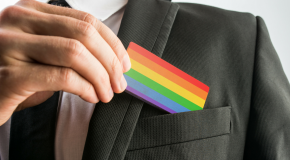ECONOMIST INTELLIGENCE UNIT REVEALS SNAPSHOT OF SURVEY ON LBGT PEOPLE IN THE WORKPLACE
Related content

Steering through collaboration: CFOs driving new priorities for the future
It is well established that the modern CFO has a more strategic role to play in a business, but a clear action plan to achieve this is lacking. A key element of this is helping the business to deal with change. Some changes are planned: launching a new product or service, setting up operations in a new region or acquiring a competitor. Others may be unexpected: a major disruption to supply-chain operations, the emergence of new regulation and legal reporting requirements or the unpredictable impacts of global economic uncertainty.
Either way, when asked about the biggest challenges they face in executing their day-to-day activities, change is a recurring theme, according to a new survey of 800 CFOs and senior finance executives, conducted by The Economist Intelligence Unit. Managing unexpected changes to financial forecasts and adapting finance processes to rapidly evolving business models are top of mind.
Managing unexpected changes to financial forecasts and adapting finance processes to rapidly evolving business models are top challenges finance executives face in executing their day to-day activities.
Finance executives are also concerned with identifying how to align strategic, financial and operational plans towards common objectives and meaningfully analysing data across business units and regions. “All functions are working to meet these challenges and, as a finance head, we have to have visibility across all functions, how they are progressing [towards meeting goals] and ensuring that their direction is in line with overall strategic goals,” says Lalit Malik, CFO of Dabur, an Indian consumer goods manufacturer. It is incumbent upon CFOs therefore to be prepared not only to help their own function navigate uncharted territory, but the rest of the business too. That means breaking down the silos that commonly exist in organisations, in order to collaborate closely across functions, sharing information and data in the pursuit of common objectives.
All functions are working to meet these challenges and, as a finance head, we have to have visibility across all functions, how they are progressing [towards meeting goals] and ensuring that their direction is in line with overall strategic goals - Lalit Malik, CFO of Dabur, an Indian consumer goods manufacturer.
The clear custodian of collaboration
There are a number of reasons why the role of leading cross-company collaboration around steering should fall to the CFO and their team. First, through the activities of budgeting, the finance function is the custodian of the clear, quantitative expression of management expectations and determines how resources such as cash and people will be allocated in order to achieve them. In our survey, 90% of respondents say that finance should facilitate collaborative enterprise planning to ensure that operational plans are aligned with financial and strategic plans.
Second, through performance management, the finance function is the gatekeeper for critical data that illustrate how well—or otherwise—the company is rising to the challenge of change. That includes data relating to sales, supply chain and delivery, which need to be reported back to the business in ways that help drive improved decisionmaking. Our survey reveals that companies in which finance executives feel empowered to drive strategic decisions across business functions are more likely to report a higher financial performance in fiscal year 2016/17 and 2017/18 and anticipate higher growth rates for 2019/20.
Download Complete Executive Summary PDF

Transforming data into action
As businesses generate and manage vast amounts of data, companies have more opportunities to gather data, incorporate insights into business strategy and continuously expand access to data across the organisation. Doing so effectively—leveraging data for strategic objectives—is often easier said than done, however. This report, Transforming data into action: the business outlook for data governance, explores the business contributions of data governance at organisations globally and across industries, the challenges faced in creating useful data governance policies and the opportunities to improve such programmes. Learn more by downloading our whitepaper below.

Rethinking professional services in an age of disruption
Innovating at scale
Technology offers companies the opportunity to create new products, find new customers and drive new efficiencies. But as any experienced executive knows, capturing these opportunities is rarely a simple matter of adoption. More often than not, a new business model is needed, one that is ideally suited to creating value from that new technology.
More from this series

white paper
Business model innovation in the UK
A healthy economy is one that enables business model innovation. That much was clear in the UK government’s industrial

white paper
Business model innovation in Germany
In 2014 the German government published its High-Tech Strategy, which aims to strengthen the country’s position as an

article
The race to acquire German innovation
Large German companies, particularly those in the country’s innovative engineering and manufacturing sectors, have

article
Culture clash - the challenge of innovation through acquisition
Despite political turbulence and currency volatility, UK companies are ready to do deals—especially if merger and

article
When customers drive innovation
With a constant stream of new technologies and emerging business models to choose from, businesses need their innovation

article
Letting customers lead
In a survey of business leaders in the UK, conducted by The Economist Intelligence Unit and sponsored by Rackspace,

infographic
Business model innovation in the UK

infographic
Business model innovation in Germany

infographic
Acquiring innovation in the UK

infographic
Can German companies buy their way to innovation?

infographic
When customers drive innovation
“The biggest disruption is that the customer is the most powerful party, because information and knowledge is with him

infographic
Letting customers lead
UK companies know that innovation must be led by their customers’ needs, a survey of 200 executives from large

video
The innovation mindset
Big companies can pioneer innovative business models too. In this video, Nick Lansley, former head

video
Innovating at Scale: Gabriel Baertschi
Grünenthal CEO Gabriel Baertschi explains the company's business model transformation

video
How PWC innovates through acquisitions
James Fillingham, head of transaction services, on the role that acquisition plays in the global advisory firm's

video
Innovation through acquisition: Can businesses buy their way into innovatio...
Big firms are hungry for more innovation than they can generate themselves, and acquisition offers them the opportunity

video
Why business innovation must be led by the customer
Big businesses are feeling the pressure from smaller rivals and the need to innovate has never been stronger. But the

video
How customers drive BMW's innovation strategy
Jonny Combe, general manager of product & channel development in BMW Financial Services believes customers are
Related content

The race to acquire German innovation
Large German companies, particularly those in the country’s innovative engineering and manufacturing sectors, have recently been making headlines as acquisition targets for foreign suitors. In 2016 the €4.5bn (US$5.4bn) acquisition of pioneering robot maker KUKA by Chinese appliance manufacturer Midea exemplified growing Chinese interest in German investments. This is driven by China’s “strategic plan to be much more focused on innovation … to enable them to shift to a more advanced industrial society”, Martin Reitz, chief executive of investment bank Rothschild Germany, told the Financial Times.
But acquisition is also a source of innovation for German companies themselves. A recent survey of business leaders in Germany, conducted by The Economist Intelligence Unit (EIU) and sponsored by Rackspace, shows that the country’s large firms are hungry to buy companies that can help them innovate. Of the 200 German respondents to the our survey, all drawn from companies with US$1bn or more in annual revenue, seven out of ten agree that acquisition is a good strategy for innovation. And one-half say they have acquired at least one smaller, innovative firm in the past five years.
However, our survey also reveals that there is strong competition for acquisitions in Germany, and merging corporate cultures while maintaining the creative spark continues to challenge firms eager to buy their way into innovation. “If you don’t achieve a common corporate culture, it will fail in the long run,” says Eike Böhm, chief technology officer at the Wiesbaden-headquartered warehouse equipment manufacturer KION, which has made two big acquisitions in the past 18 months.
Challenging decisionsAmong survey respondents who have made acquisitions in pursuit of innovation, the most common reasons are “making products and services more innovative” (44%) and “making internal processes more innovative” (43%), although German respondents are more likely to have conducted an acquisition to adopt a more innovative business model than their peers from the UK (33% vs 26%). German companies are also twice as likely to have bought a company to neutralise an emerging competitive threat than those from the UK (16% vs 8%).
However, the clearest distinction between German and UK firms with respect to their approach to innovation through acquisition is their primary reason not to acquire through innovation. German firms which have failed to acquire a smaller, innovative firm in the past five years cite as their chief reason—with 42% of respondents—that other companies outbid them or moved faster on their acquisition targets (see chart 1). In the UK, only 29% of respondents chose this option.
So why do German companies get outbid and overtaken? As a recent report by German law firm Heuking Kühn Lüer Wojtek observes, most mergers and acquisitions (M&As) in the country involve private rather than listed firms. This makes it harder to establish the appropriate price for the target while also making extended auctions more likely, thus driving up the price. “I think there is huge competition [in the German M&A market],” notes Dr Böhm.
Financing acquisitions is the most common challenge to innovation through acquisition, our survey reveals, cited by 45% of respondents. But this is not for lack of funding sources, according to Heuking Kühn Lüer Wojtek, whose report notes that “money is available in the market at all ends, and does not appear to make deals complicated”. Dr Böhm concurs, saying he does not see a “lack of money” around. The challenge of securing that finance, therefore, may lie in making the business case for an innovative investment. By its nature, investing in an innovative product or business model is a gamble, and it would appear that German firms are struggling to justify their bets.
Cultural resistanceThe second most commonly cited challenge (44% of respondents) is integrating acquired firms into their corporate culture and organisational structure.
KION, whose roots lie in manufacturing forklift trucks, made two significant acquisitions in recent years—Egemin and Dematic—both of which brought expertise and innovation in the field of warehouse automation. This has allowed the company to present a broader, more integrated suite of offerings to its customers. “An acquisition must create additional value,” Dr Böhm explains. “If you just acquire to be larger, this doesn’t make sense.”
According to Dr Böhm, the key to the successful integration of corporate cultures is to avoid “imperialistic behaviour”, as he puts it. “This is what causes massive resistance, because the employees aren’t stupid. They’ve done a good job and had a very good performance and good profitability, and then they have to listen how to do their business. They will ignore this. It will not work. Then you cause resistance.”
Instead, Dr Böhm suggests, the best approach is to “cherry-pick” the strengths of the acquired company that best complement those of the acquirer. Dematic’s engineers were experts in agile engineering while KION had a culture of value engineering, so the combined operation married the two approaches.
A common mistake is to assume that the obligation to change rests solely with the acquired firm. In fact, the acquirer must itself adapt to ensure that the innovative qualities of the acquisition target are preserved and fully exploited. “To build a new capability through acquisition, at least half of the effort must be channelled into transforming the existing culture of the acquirer, so that established metrics foster rather than exterminate the new ideas and technologies coming in,” consultancy PwC warns.
There is little agreement among respondents on the best way to manage an acquired business once the deal is complete. Over one-third of German respondents say that apart from common functions such as finance, the best way is to allow the acquired firm to operate as a separate entity, indefinitely. But more believe the acquisition target should be integrated into the larger company once it reaches a certain level of maturity, either quickly (29%) or gradually (24%).
The pace of integrationIn KION’s case, though, the Dematic integration happened within the space of a few weeks. Dr Böhm puts this down to preparation, while also noting that the staff of Dematic—which had two private equity owners—were “very happy” to have found a home in a company that was trying to create sustainable growth, rather than sell them on. “They were also interested in a fast integration,” he adds.
In Dr Böhm’s view, rapid integration helps employees to stay focused on the task at hand. “In my career, I experienced [various] integrations that failed, because they [took] too long,” he explains. “People lost focus and momentum.”
It is also vital that personnel from the acquired firm, particularly senior staff, can see that the acquisition broadens their horizons. This means ensuring that they are successfully integrated into teams across the group, rather than being segmented off with other employees who joined through the acquisition. “You have to give the people a career path [where] they can contribute and feel that they are important—that they have responsibility over [people representing] the entire company, not just the acquired guys,” says Dr Böhm. “All over the company, we created mixed teams.”
It is most important, however, to have a clear integration strategy before you choose your acquisition targets. “You have to think how to integrate, and then find the company to acquire.”
These are lessons that will prove strategically crucial, and increasingly so. Almost half (49%) of the survey’s German respondents say their companies are actively pursuing acquisitions of innovative firms, and 40% would consider such an acquisition if an opportunity arose. If competition is already fierce, it’s only going to heat up even more. Those who succeed are likely to be the ones who know what they want and are ready to make the most of the innovation they have acquired.

Culture clash - the challenge of innovation through acquisition
Despite political turbulence and currency volatility, UK companies are ready to do deals—especially if merger and acquisition (M&A) activity allows them to get their hands on valuable innovations. In uncertain times acquisitions offer routes to innovation that internal resources alone cannot provide.
In a recent survey of 200 business leaders in the UK, conducted by The Economist Intelligence Unit (EIU) and sponsored by Rackspace, two-thirds of respondents agree that acquisition is a good strategy for enhancing innovation, while the same proportion believes that the acquisition of innovative start-ups is a critical success factor in their industry.
Those beliefs translate into action: 59% of respondents say their company has acquired at least one smaller, innovative firm during the past five years, and just over half (51%) are now actively searching for new acquisitions. A further 40% say that their company will consider an acquisition over the next three years, should the right opportunity present itself.
Indeed, M&A activity is increasingly driven by a thirst for innovation, according to a recent report from professional services firm Deloitte. Globally, companies spent US$300bn on “disruptive, innovation-related” M&A deals in 2016, four times more than in 2012, its study found. For large companies with deep pockets acquisition offers the opportunity to find winning ideas and amplify them to corporate scale. According to our survey, over half of UK respondents (57%) believe that the resources of a large company, together with the agility of a smaller firm, “create a strong combination”.
But acquisitions are difficult to get right. According to a study by US management consultancy AT Kearney, as many as 60% of M&A deals fail to deliver value.2 Acquiring for innovation may be especially challenging, as the ability to innovate is a facet of an organisation’s culture that can all too easily be snuffed out. Business leaders who wish to innovate successfully through acquisition must be adept at integrating organisational cultures and keeping talented staff on side.
Integrating culturesThere are many attributes companies look for in an acquisition, including access to a wider market of customers and innovative technology. For 22% of UK respondents, a corporate culture similar to their own is a key trait in a potential target.
“There have been examples of companies where we think the technology’s good,” Mr MacLeod explains, “but there’s a lack of cultural ‘fit’, and that’s as important to us as having a technology fit. If y you don’t have the culture aspects, then the integration will almost certainly fail.”
Company culture, Mr McLeod points out, defines how people work together to achieve business goals. This has particular relevance when it comes to innovation: it can be hard to launch a new product, for example, or arrive at a new scientific breakthrough against a backdrop of misunderstanding or even mistrust. A poor cultural fit can be highly disruptive, throwing projects off the track and delaying crucial decisions.
Successfully integrating a company post-merger is a critical success factor for any deal. Handled badly, it can undermine the value that the acquired company brings to its new owner. With innovative firms the challenge is especially complex: how can the buyer integrate the acquired firm without snuffing out its innovative spark?
There is little agreement among survey respondents: 30% believe the acquired companies should operate as a separate entity, with the exception of common functions such as finance; 28% believe it should do so only until it reaches a certain level of maturity and should then be gradually integrated; and 27% believe that once that maturity is reached, it should be quickly integrated.
Johnson Matthey sees value in closely integrating acquisitions into the main firm. “That’s how you create the necessary synergies,” says Mr MacLeod. “Products can maintain their own brand identity under a new owner, but with people and processes we need unity, so that both internally and externally there’s an understanding of what our opportunity is and what we bring to the market.”
The challenge of integrating two companies while preserving the culture that makes the acquired firm valuable calls for considered and deliberate management. The authors of the 2017 M&A Integration Survey Report by professional services company PwC say that change, or at least compromise, is necessary. Managers, they argue, must define their desired behaviours, highlight internal role models who demonstrate those behaviours, and provide meaningful incentives for employees to make the necessary changes.
The ability to manage cultural integration explicitly is often undermined by a shallow understanding of what organisational culture really is, a report from strategy firm McKinsey & Company argues. “Culture is much deeper than a good first impression, a sense that you share the same values or the more trivial practices, say, of wearing (or not wearing) jeans on Fridays.” But too often, the authors say, managers focus on the wrong things, “addressing the most visible expressions of culture, rather than the underlying management practices and working norms”.
As an example of how things should be done, the authors point to the integration of two European industrial companies, where managers from both sides identified ten potential cultural goals as joint areas for improvement, joint areas of strength, or areas of difference. “Quickly achieving the benefits of their similarities created the momentum and trust required for addressing many of the thornier issues the managers faced,” they write.
Talent mattersThe co-operation of senior executives at the acquired firm can make or break an acquisition. In our survey, 27% of respondents say that the willingness of senior executives from the acquired firm to stay at the company had a significant bearing on the success of their acquisitions.
Hikma Pharmaceuticals, a UK-headquartered drug manufacturer, has acquired a number of firms to access innovative technologies and international markets. According to Bassam Kanaan, the company’s chief strategy and corporate development officer, securing the commitment of the executives at the company being acquired is just as important. “If you get that right and you have their consensus and commitment, then by the time the acquisition is finalised, they will do much of the work of driving the integration on the business’s behalf.”
But for innovation to continue, talented employees at all levels—especially those responsible for advancing products, process or strategy—must see the value the acquisition offers them personally.
“We put a great deal of effort into communicating to acquired employees about the new opportunities we can offer them,” says Mr McLeod. “We explain that we bought their company because of their technology, but now we want to do more. We want to invest in their technology, we want to add to it. It’s important they see how their technology benefits from being part of [us]. It’s their chance to take their science and ideas even further and do even more with it.”
James Fillingham, head of transaction services at PwC, describes how the firm handles its own integrations: “We take what they [acquired employees] are good at, we put them in a place with people who think in a like-minded way, and then we put in place a framework to help us industrialise and commercialise that more effectively.”
“We love to hit the revenue targets, but actually, retaining those people and retaining what made them special is more important, because if you do that well, it enables them to continue to grow, to continue to develop the next idea, and then to take it to the next level. If we can make that work, on a big, PwC-sized playing field, at that point we’ve developed real value.”
UK business leaders clearly see acquisition as a valid innovation strategy. To make it work, they must position their company as a platform for good ideas and an amplifier for the ambitions of talented employees.

How PWC innovates through acquisitions
James Fillingham, head of transaction services, on the role that acquisition plays in the global advisory firm's innovation strategy:
“We take what they [acquired employees] are good at, we put them in a place with people who think in a like-minded way, and then we put in place a framework to help us industrialise and commercialise that more effectively.”
“We love to hit the revenue targets, but actually, retaining those people and retaining what made them special is more important, because if you do that well, it enables them to continue to grow, to continue to develop the next idea, and then to take it to the next level. If we can make that work, on a big, PwC-sized playing field, at that point we’ve developed real value.”
Idea management platforms supporting great ideas
Related content

Steering through collaboration: CFOs driving new priorities for the future
It is well established that the modern CFO has a more strategic role to play in a business, but a clear action plan to achieve this is lacking. A key element of this is helping the business to deal with change. Some changes are planned: launching a new product or service, setting up operations in a new region or acquiring a competitor. Others may be unexpected: a major disruption to supply-chain operations, the emergence of new regulation and legal reporting requirements or the unpredictable impacts of global economic uncertainty.
Either way, when asked about the biggest challenges they face in executing their day-to-day activities, change is a recurring theme, according to a new survey of 800 CFOs and senior finance executives, conducted by The Economist Intelligence Unit. Managing unexpected changes to financial forecasts and adapting finance processes to rapidly evolving business models are top of mind.
Managing unexpected changes to financial forecasts and adapting finance processes to rapidly evolving business models are top challenges finance executives face in executing their day to-day activities.
Finance executives are also concerned with identifying how to align strategic, financial and operational plans towards common objectives and meaningfully analysing data across business units and regions. “All functions are working to meet these challenges and, as a finance head, we have to have visibility across all functions, how they are progressing [towards meeting goals] and ensuring that their direction is in line with overall strategic goals,” says Lalit Malik, CFO of Dabur, an Indian consumer goods manufacturer. It is incumbent upon CFOs therefore to be prepared not only to help their own function navigate uncharted territory, but the rest of the business too. That means breaking down the silos that commonly exist in organisations, in order to collaborate closely across functions, sharing information and data in the pursuit of common objectives.
All functions are working to meet these challenges and, as a finance head, we have to have visibility across all functions, how they are progressing [towards meeting goals] and ensuring that their direction is in line with overall strategic goals - Lalit Malik, CFO of Dabur, an Indian consumer goods manufacturer.
The clear custodian of collaboration
There are a number of reasons why the role of leading cross-company collaboration around steering should fall to the CFO and their team. First, through the activities of budgeting, the finance function is the custodian of the clear, quantitative expression of management expectations and determines how resources such as cash and people will be allocated in order to achieve them. In our survey, 90% of respondents say that finance should facilitate collaborative enterprise planning to ensure that operational plans are aligned with financial and strategic plans.
Second, through performance management, the finance function is the gatekeeper for critical data that illustrate how well—or otherwise—the company is rising to the challenge of change. That includes data relating to sales, supply chain and delivery, which need to be reported back to the business in ways that help drive improved decisionmaking. Our survey reveals that companies in which finance executives feel empowered to drive strategic decisions across business functions are more likely to report a higher financial performance in fiscal year 2016/17 and 2017/18 and anticipate higher growth rates for 2019/20.
Download Complete Executive Summary PDF

Transforming data into action
As businesses generate and manage vast amounts of data, companies have more opportunities to gather data, incorporate insights into business strategy and continuously expand access to data across the organisation. Doing so effectively—leveraging data for strategic objectives—is often easier said than done, however. This report, Transforming data into action: the business outlook for data governance, explores the business contributions of data governance at organisations globally and across industries, the challenges faced in creating useful data governance policies and the opportunities to improve such programmes. Learn more by downloading our whitepaper below.

Rethinking professional services in an age of disruption
Pride and Prejudice: Changemakers
Related content

Steering through collaboration: CFOs driving new priorities for the future
It is well established that the modern CFO has a more strategic role to play in a business, but a clear action plan to achieve this is lacking. A key element of this is helping the business to deal with change. Some changes are planned: launching a new product or service, setting up operations in a new region or acquiring a competitor. Others may be unexpected: a major disruption to supply-chain operations, the emergence of new regulation and legal reporting requirements or the unpredictable impacts of global economic uncertainty.
Either way, when asked about the biggest challenges they face in executing their day-to-day activities, change is a recurring theme, according to a new survey of 800 CFOs and senior finance executives, conducted by The Economist Intelligence Unit. Managing unexpected changes to financial forecasts and adapting finance processes to rapidly evolving business models are top of mind.
Managing unexpected changes to financial forecasts and adapting finance processes to rapidly evolving business models are top challenges finance executives face in executing their day to-day activities.
Finance executives are also concerned with identifying how to align strategic, financial and operational plans towards common objectives and meaningfully analysing data across business units and regions. “All functions are working to meet these challenges and, as a finance head, we have to have visibility across all functions, how they are progressing [towards meeting goals] and ensuring that their direction is in line with overall strategic goals,” says Lalit Malik, CFO of Dabur, an Indian consumer goods manufacturer. It is incumbent upon CFOs therefore to be prepared not only to help their own function navigate uncharted territory, but the rest of the business too. That means breaking down the silos that commonly exist in organisations, in order to collaborate closely across functions, sharing information and data in the pursuit of common objectives.
All functions are working to meet these challenges and, as a finance head, we have to have visibility across all functions, how they are progressing [towards meeting goals] and ensuring that their direction is in line with overall strategic goals - Lalit Malik, CFO of Dabur, an Indian consumer goods manufacturer.
The clear custodian of collaboration
There are a number of reasons why the role of leading cross-company collaboration around steering should fall to the CFO and their team. First, through the activities of budgeting, the finance function is the custodian of the clear, quantitative expression of management expectations and determines how resources such as cash and people will be allocated in order to achieve them. In our survey, 90% of respondents say that finance should facilitate collaborative enterprise planning to ensure that operational plans are aligned with financial and strategic plans.
Second, through performance management, the finance function is the gatekeeper for critical data that illustrate how well—or otherwise—the company is rising to the challenge of change. That includes data relating to sales, supply chain and delivery, which need to be reported back to the business in ways that help drive improved decisionmaking. Our survey reveals that companies in which finance executives feel empowered to drive strategic decisions across business functions are more likely to report a higher financial performance in fiscal year 2016/17 and 2017/18 and anticipate higher growth rates for 2019/20.
Download Complete Executive Summary PDF

Transforming data into action
As businesses generate and manage vast amounts of data, companies have more opportunities to gather data, incorporate insights into business strategy and continuously expand access to data across the organisation. Doing so effectively—leveraging data for strategic objectives—is often easier said than done, however. This report, Transforming data into action: the business outlook for data governance, explores the business contributions of data governance at organisations globally and across industries, the challenges faced in creating useful data governance policies and the opportunities to improve such programmes. Learn more by downloading our whitepaper below.

Rethinking professional services in an age of disruption
Pride and Prejudice: Agents of Change
The report, based on a global survey of over 1,000 executives, posits a framework toward achieving positive change for LGBT employees via three key workplace groups: leadership, young people and women.
More from this series

white paper
Pride and Prejudice: Agents of Change
In 2016, The Economist Group launched the first iteration of Pride and Prejudice: The business and economic case for

white paper
驕傲與偏見:變革的動力
2016

white paper
骄傲与偏见:变革的动力
2016

blog
Pride and Prejudice: Changemakers
Amid the rise in right-wing populist movements across the Western world, one perennial whipping boy has been relatively

video
Pride and Prejudice: Facebook live chat
Watch Michael Gold, writer of Pride and Prejudice: Agents of change, and Alfred Chan, chairperson of the Equal
Related content

Steering through collaboration: CFOs driving new priorities for the future
It is well established that the modern CFO has a more strategic role to play in a business, but a clear action plan to achieve this is lacking. A key element of this is helping the business to deal with change. Some changes are planned: launching a new product or service, setting up operations in a new region or acquiring a competitor. Others may be unexpected: a major disruption to supply-chain operations, the emergence of new regulation and legal reporting requirements or the unpredictable impacts of global economic uncertainty.
Either way, when asked about the biggest challenges they face in executing their day-to-day activities, change is a recurring theme, according to a new survey of 800 CFOs and senior finance executives, conducted by The Economist Intelligence Unit. Managing unexpected changes to financial forecasts and adapting finance processes to rapidly evolving business models are top of mind.
Managing unexpected changes to financial forecasts and adapting finance processes to rapidly evolving business models are top challenges finance executives face in executing their day to-day activities.
Finance executives are also concerned with identifying how to align strategic, financial and operational plans towards common objectives and meaningfully analysing data across business units and regions. “All functions are working to meet these challenges and, as a finance head, we have to have visibility across all functions, how they are progressing [towards meeting goals] and ensuring that their direction is in line with overall strategic goals,” says Lalit Malik, CFO of Dabur, an Indian consumer goods manufacturer. It is incumbent upon CFOs therefore to be prepared not only to help their own function navigate uncharted territory, but the rest of the business too. That means breaking down the silos that commonly exist in organisations, in order to collaborate closely across functions, sharing information and data in the pursuit of common objectives.
All functions are working to meet these challenges and, as a finance head, we have to have visibility across all functions, how they are progressing [towards meeting goals] and ensuring that their direction is in line with overall strategic goals - Lalit Malik, CFO of Dabur, an Indian consumer goods manufacturer.
The clear custodian of collaboration
There are a number of reasons why the role of leading cross-company collaboration around steering should fall to the CFO and their team. First, through the activities of budgeting, the finance function is the custodian of the clear, quantitative expression of management expectations and determines how resources such as cash and people will be allocated in order to achieve them. In our survey, 90% of respondents say that finance should facilitate collaborative enterprise planning to ensure that operational plans are aligned with financial and strategic plans.
Second, through performance management, the finance function is the gatekeeper for critical data that illustrate how well—or otherwise—the company is rising to the challenge of change. That includes data relating to sales, supply chain and delivery, which need to be reported back to the business in ways that help drive improved decisionmaking. Our survey reveals that companies in which finance executives feel empowered to drive strategic decisions across business functions are more likely to report a higher financial performance in fiscal year 2016/17 and 2017/18 and anticipate higher growth rates for 2019/20.
Download Complete Executive Summary PDF

Transforming data into action
As businesses generate and manage vast amounts of data, companies have more opportunities to gather data, incorporate insights into business strategy and continuously expand access to data across the organisation. Doing so effectively—leveraging data for strategic objectives—is often easier said than done, however. This report, Transforming data into action: the business outlook for data governance, explores the business contributions of data governance at organisations globally and across industries, the challenges faced in creating useful data governance policies and the opportunities to improve such programmes. Learn more by downloading our whitepaper below.

Rethinking professional services in an age of disruption
Pride and Prejudice: Agents of Change
In 2016, The Economist Group launched the first iteration of Pride and Prejudice: The business and economic case for lesbian, gay, bisexual and transgender (LGBT) diversity and inclusion. As part of the initiative, The Economist Intelligence Unit (EIU) conducted a study exploring the status of LGBT people in the workplace, based on an extensive global survey and in-depth desk research. Now in its second year, the research examines those groups best poised to drive positive change for LGBT people in the workplace: company leaders, young people and women.
Related content

Steering through collaboration: CFOs driving new priorities for the future
It is well established that the modern CFO has a more strategic role to play in a business, but a clear action plan to achieve this is lacking. A key element of this is helping the business to deal with change. Some changes are planned: launching a new product or service, setting up operations in a new region or acquiring a competitor. Others may be unexpected: a major disruption to supply-chain operations, the emergence of new regulation and legal reporting requirements or the unpredictable impacts of global economic uncertainty.
Either way, when asked about the biggest challenges they face in executing their day-to-day activities, change is a recurring theme, according to a new survey of 800 CFOs and senior finance executives, conducted by The Economist Intelligence Unit. Managing unexpected changes to financial forecasts and adapting finance processes to rapidly evolving business models are top of mind.
Managing unexpected changes to financial forecasts and adapting finance processes to rapidly evolving business models are top challenges finance executives face in executing their day to-day activities.
Finance executives are also concerned with identifying how to align strategic, financial and operational plans towards common objectives and meaningfully analysing data across business units and regions. “All functions are working to meet these challenges and, as a finance head, we have to have visibility across all functions, how they are progressing [towards meeting goals] and ensuring that their direction is in line with overall strategic goals,” says Lalit Malik, CFO of Dabur, an Indian consumer goods manufacturer. It is incumbent upon CFOs therefore to be prepared not only to help their own function navigate uncharted territory, but the rest of the business too. That means breaking down the silos that commonly exist in organisations, in order to collaborate closely across functions, sharing information and data in the pursuit of common objectives.
All functions are working to meet these challenges and, as a finance head, we have to have visibility across all functions, how they are progressing [towards meeting goals] and ensuring that their direction is in line with overall strategic goals - Lalit Malik, CFO of Dabur, an Indian consumer goods manufacturer.
The clear custodian of collaboration
There are a number of reasons why the role of leading cross-company collaboration around steering should fall to the CFO and their team. First, through the activities of budgeting, the finance function is the custodian of the clear, quantitative expression of management expectations and determines how resources such as cash and people will be allocated in order to achieve them. In our survey, 90% of respondents say that finance should facilitate collaborative enterprise planning to ensure that operational plans are aligned with financial and strategic plans.
Second, through performance management, the finance function is the gatekeeper for critical data that illustrate how well—or otherwise—the company is rising to the challenge of change. That includes data relating to sales, supply chain and delivery, which need to be reported back to the business in ways that help drive improved decisionmaking. Our survey reveals that companies in which finance executives feel empowered to drive strategic decisions across business functions are more likely to report a higher financial performance in fiscal year 2016/17 and 2017/18 and anticipate higher growth rates for 2019/20.
Download Complete Executive Summary PDF

Transforming data into action
As businesses generate and manage vast amounts of data, companies have more opportunities to gather data, incorporate insights into business strategy and continuously expand access to data across the organisation. Doing so effectively—leveraging data for strategic objectives—is often easier said than done, however. This report, Transforming data into action: the business outlook for data governance, explores the business contributions of data governance at organisations globally and across industries, the challenges faced in creating useful data governance policies and the opportunities to improve such programmes. Learn more by downloading our whitepaper below.

Rethinking professional services in an age of disruption
More with less: a marketer's mantra on efficiency
The term “frugal innovation” describes a significant shift occurring in the business world: the drive to deliver high-quality products and services at affordable prices. In marketing, it often means working smarter with fewer resources... Read full article>>
Related content

Sufficiently efficient: 4 ways marketers achieve efficiency by doing more w...
With the proliferation of communication channels and shrinking budgets, how are marketers boosting efficiency and meeting changing demands? View infographic>>
More from Marketing Efficiency Series
Lost in transcreation
When it comes to symbols, the smile reigns supreme. Its one connotation—happiness—is undisputed the world over. Yet despite the smile’s universal appeal, research suggests that culture affects our perceptions of it in unexpected ways... Read full article >>
The meaning of subtle symbols like smiles and colours varies between Asian and Western cultures. What should marketers bear in mind when launching global campaigns? View infographic >>

Steering through collaboration: CFOs driving new priorities for the future
It is well established that the modern CFO has a more strategic role to play in a business, but a clear action plan to achieve this is lacking. A key element of this is helping the business to deal with change. Some changes are planned: launching a new product or service, setting up operations in a new region or acquiring a competitor. Others may be unexpected: a major disruption to supply-chain operations, the emergence of new regulation and legal reporting requirements or the unpredictable impacts of global economic uncertainty.
Either way, when asked about the biggest challenges they face in executing their day-to-day activities, change is a recurring theme, according to a new survey of 800 CFOs and senior finance executives, conducted by The Economist Intelligence Unit. Managing unexpected changes to financial forecasts and adapting finance processes to rapidly evolving business models are top of mind.
Managing unexpected changes to financial forecasts and adapting finance processes to rapidly evolving business models are top challenges finance executives face in executing their day to-day activities.
Finance executives are also concerned with identifying how to align strategic, financial and operational plans towards common objectives and meaningfully analysing data across business units and regions. “All functions are working to meet these challenges and, as a finance head, we have to have visibility across all functions, how they are progressing [towards meeting goals] and ensuring that their direction is in line with overall strategic goals,” says Lalit Malik, CFO of Dabur, an Indian consumer goods manufacturer. It is incumbent upon CFOs therefore to be prepared not only to help their own function navigate uncharted territory, but the rest of the business too. That means breaking down the silos that commonly exist in organisations, in order to collaborate closely across functions, sharing information and data in the pursuit of common objectives.
All functions are working to meet these challenges and, as a finance head, we have to have visibility across all functions, how they are progressing [towards meeting goals] and ensuring that their direction is in line with overall strategic goals - Lalit Malik, CFO of Dabur, an Indian consumer goods manufacturer.
The clear custodian of collaboration
There are a number of reasons why the role of leading cross-company collaboration around steering should fall to the CFO and their team. First, through the activities of budgeting, the finance function is the custodian of the clear, quantitative expression of management expectations and determines how resources such as cash and people will be allocated in order to achieve them. In our survey, 90% of respondents say that finance should facilitate collaborative enterprise planning to ensure that operational plans are aligned with financial and strategic plans.
Second, through performance management, the finance function is the gatekeeper for critical data that illustrate how well—or otherwise—the company is rising to the challenge of change. That includes data relating to sales, supply chain and delivery, which need to be reported back to the business in ways that help drive improved decisionmaking. Our survey reveals that companies in which finance executives feel empowered to drive strategic decisions across business functions are more likely to report a higher financial performance in fiscal year 2016/17 and 2017/18 and anticipate higher growth rates for 2019/20.
Download Complete Executive Summary PDF
The data-driven CFO
Artificial intelligence, machine learning and big data can all facilitate financial reporting and compliance, monitor market movements, track supply chain inefficiencies, enable smarter outsourcing, support workforce and talent management efforts, and predict future trends. When they fail, modern technologies can destroy entire businesses and their reputations: most notable are the hacks and privacy breaches that are increasingly a top worry about executives across the C-suite.
16394
Related content

Steering through collaboration: CFOs driving new priorities for the future
It is well established that the modern CFO has a more strategic role to play in a business, but a clear action plan to achieve this is lacking. A key element of this is helping the business to deal with change. Some changes are planned: launching a new product or service, setting up operations in a new region or acquiring a competitor. Others may be unexpected: a major disruption to supply-chain operations, the emergence of new regulation and legal reporting requirements or the unpredictable impacts of global economic uncertainty.
Either way, when asked about the biggest challenges they face in executing their day-to-day activities, change is a recurring theme, according to a new survey of 800 CFOs and senior finance executives, conducted by The Economist Intelligence Unit. Managing unexpected changes to financial forecasts and adapting finance processes to rapidly evolving business models are top of mind.
Managing unexpected changes to financial forecasts and adapting finance processes to rapidly evolving business models are top challenges finance executives face in executing their day to-day activities.
Finance executives are also concerned with identifying how to align strategic, financial and operational plans towards common objectives and meaningfully analysing data across business units and regions. “All functions are working to meet these challenges and, as a finance head, we have to have visibility across all functions, how they are progressing [towards meeting goals] and ensuring that their direction is in line with overall strategic goals,” says Lalit Malik, CFO of Dabur, an Indian consumer goods manufacturer. It is incumbent upon CFOs therefore to be prepared not only to help their own function navigate uncharted territory, but the rest of the business too. That means breaking down the silos that commonly exist in organisations, in order to collaborate closely across functions, sharing information and data in the pursuit of common objectives.
All functions are working to meet these challenges and, as a finance head, we have to have visibility across all functions, how they are progressing [towards meeting goals] and ensuring that their direction is in line with overall strategic goals - Lalit Malik, CFO of Dabur, an Indian consumer goods manufacturer.
The clear custodian of collaboration
There are a number of reasons why the role of leading cross-company collaboration around steering should fall to the CFO and their team. First, through the activities of budgeting, the finance function is the custodian of the clear, quantitative expression of management expectations and determines how resources such as cash and people will be allocated in order to achieve them. In our survey, 90% of respondents say that finance should facilitate collaborative enterprise planning to ensure that operational plans are aligned with financial and strategic plans.
Second, through performance management, the finance function is the gatekeeper for critical data that illustrate how well—or otherwise—the company is rising to the challenge of change. That includes data relating to sales, supply chain and delivery, which need to be reported back to the business in ways that help drive improved decisionmaking. Our survey reveals that companies in which finance executives feel empowered to drive strategic decisions across business functions are more likely to report a higher financial performance in fiscal year 2016/17 and 2017/18 and anticipate higher growth rates for 2019/20.
Download Complete Executive Summary PDF

Transforming data into action
As businesses generate and manage vast amounts of data, companies have more opportunities to gather data, incorporate insights into business strategy and continuously expand access to data across the organisation. Doing so effectively—leveraging data for strategic objectives—is often easier said than done, however. This report, Transforming data into action: the business outlook for data governance, explores the business contributions of data governance at organisations globally and across industries, the challenges faced in creating useful data governance policies and the opportunities to improve such programmes. Learn more by downloading our whitepaper below.

Rethinking professional services in an age of disruption
The human resource: From cost to asset
To less-enlightened CFOs, human capital is viewed as a cost to be managed. Even after many advances in productivity, average human capital costs are, admittedly, still a major operational expense. But in the modern global economy, where ideas and digital skills – rather than physical resources – are increasingly where economic value is realised, people can be a company’s greatest asset. CFOs need to see the workforce as an engine of innovation, rather than a cost to be managed.
16393
Related content

Steering through collaboration: CFOs driving new priorities for the future
It is well established that the modern CFO has a more strategic role to play in a business, but a clear action plan to achieve this is lacking. A key element of this is helping the business to deal with change. Some changes are planned: launching a new product or service, setting up operations in a new region or acquiring a competitor. Others may be unexpected: a major disruption to supply-chain operations, the emergence of new regulation and legal reporting requirements or the unpredictable impacts of global economic uncertainty.
Either way, when asked about the biggest challenges they face in executing their day-to-day activities, change is a recurring theme, according to a new survey of 800 CFOs and senior finance executives, conducted by The Economist Intelligence Unit. Managing unexpected changes to financial forecasts and adapting finance processes to rapidly evolving business models are top of mind.
Managing unexpected changes to financial forecasts and adapting finance processes to rapidly evolving business models are top challenges finance executives face in executing their day to-day activities.
Finance executives are also concerned with identifying how to align strategic, financial and operational plans towards common objectives and meaningfully analysing data across business units and regions. “All functions are working to meet these challenges and, as a finance head, we have to have visibility across all functions, how they are progressing [towards meeting goals] and ensuring that their direction is in line with overall strategic goals,” says Lalit Malik, CFO of Dabur, an Indian consumer goods manufacturer. It is incumbent upon CFOs therefore to be prepared not only to help their own function navigate uncharted territory, but the rest of the business too. That means breaking down the silos that commonly exist in organisations, in order to collaborate closely across functions, sharing information and data in the pursuit of common objectives.
All functions are working to meet these challenges and, as a finance head, we have to have visibility across all functions, how they are progressing [towards meeting goals] and ensuring that their direction is in line with overall strategic goals - Lalit Malik, CFO of Dabur, an Indian consumer goods manufacturer.
The clear custodian of collaboration
There are a number of reasons why the role of leading cross-company collaboration around steering should fall to the CFO and their team. First, through the activities of budgeting, the finance function is the custodian of the clear, quantitative expression of management expectations and determines how resources such as cash and people will be allocated in order to achieve them. In our survey, 90% of respondents say that finance should facilitate collaborative enterprise planning to ensure that operational plans are aligned with financial and strategic plans.
Second, through performance management, the finance function is the gatekeeper for critical data that illustrate how well—or otherwise—the company is rising to the challenge of change. That includes data relating to sales, supply chain and delivery, which need to be reported back to the business in ways that help drive improved decisionmaking. Our survey reveals that companies in which finance executives feel empowered to drive strategic decisions across business functions are more likely to report a higher financial performance in fiscal year 2016/17 and 2017/18 and anticipate higher growth rates for 2019/20.
Download Complete Executive Summary PDF

Transforming data into action
As businesses generate and manage vast amounts of data, companies have more opportunities to gather data, incorporate insights into business strategy and continuously expand access to data across the organisation. Doing so effectively—leveraging data for strategic objectives—is often easier said than done, however. This report, Transforming data into action: the business outlook for data governance, explores the business contributions of data governance at organisations globally and across industries, the challenges faced in creating useful data governance policies and the opportunities to improve such programmes. Learn more by downloading our whitepaper below.

Rethinking professional services in an age of disruption
CFO and CEO: Business Partners, or married couple?
This is partly because of the role of the CEO has changed quite dramatically. In the era of shareholder capitalism, with a 24/7 media cycle, CEOs have become more public facing. This means many of their duties have, over time, been shared with others in the C-suite. Download article below.
16392
Related content

Steering through collaboration: CFOs driving new priorities for the future
It is well established that the modern CFO has a more strategic role to play in a business, but a clear action plan to achieve this is lacking. A key element of this is helping the business to deal with change. Some changes are planned: launching a new product or service, setting up operations in a new region or acquiring a competitor. Others may be unexpected: a major disruption to supply-chain operations, the emergence of new regulation and legal reporting requirements or the unpredictable impacts of global economic uncertainty.
Either way, when asked about the biggest challenges they face in executing their day-to-day activities, change is a recurring theme, according to a new survey of 800 CFOs and senior finance executives, conducted by The Economist Intelligence Unit. Managing unexpected changes to financial forecasts and adapting finance processes to rapidly evolving business models are top of mind.
Managing unexpected changes to financial forecasts and adapting finance processes to rapidly evolving business models are top challenges finance executives face in executing their day to-day activities.
Finance executives are also concerned with identifying how to align strategic, financial and operational plans towards common objectives and meaningfully analysing data across business units and regions. “All functions are working to meet these challenges and, as a finance head, we have to have visibility across all functions, how they are progressing [towards meeting goals] and ensuring that their direction is in line with overall strategic goals,” says Lalit Malik, CFO of Dabur, an Indian consumer goods manufacturer. It is incumbent upon CFOs therefore to be prepared not only to help their own function navigate uncharted territory, but the rest of the business too. That means breaking down the silos that commonly exist in organisations, in order to collaborate closely across functions, sharing information and data in the pursuit of common objectives.
All functions are working to meet these challenges and, as a finance head, we have to have visibility across all functions, how they are progressing [towards meeting goals] and ensuring that their direction is in line with overall strategic goals - Lalit Malik, CFO of Dabur, an Indian consumer goods manufacturer.
The clear custodian of collaboration
There are a number of reasons why the role of leading cross-company collaboration around steering should fall to the CFO and their team. First, through the activities of budgeting, the finance function is the custodian of the clear, quantitative expression of management expectations and determines how resources such as cash and people will be allocated in order to achieve them. In our survey, 90% of respondents say that finance should facilitate collaborative enterprise planning to ensure that operational plans are aligned with financial and strategic plans.
Second, through performance management, the finance function is the gatekeeper for critical data that illustrate how well—or otherwise—the company is rising to the challenge of change. That includes data relating to sales, supply chain and delivery, which need to be reported back to the business in ways that help drive improved decisionmaking. Our survey reveals that companies in which finance executives feel empowered to drive strategic decisions across business functions are more likely to report a higher financial performance in fiscal year 2016/17 and 2017/18 and anticipate higher growth rates for 2019/20.
Download Complete Executive Summary PDF

Transforming data into action
As businesses generate and manage vast amounts of data, companies have more opportunities to gather data, incorporate insights into business strategy and continuously expand access to data across the organisation. Doing so effectively—leveraging data for strategic objectives—is often easier said than done, however. This report, Transforming data into action: the business outlook for data governance, explores the business contributions of data governance at organisations globally and across industries, the challenges faced in creating useful data governance policies and the opportunities to improve such programmes. Learn more by downloading our whitepaper below.

